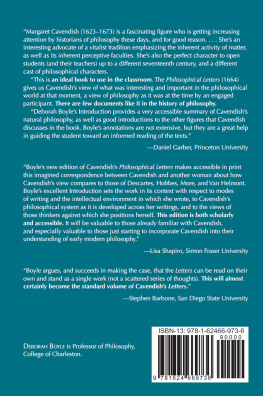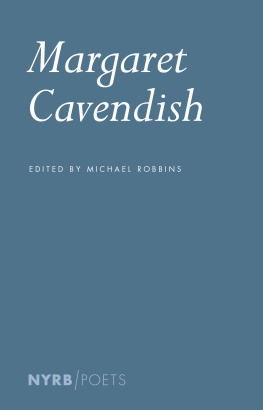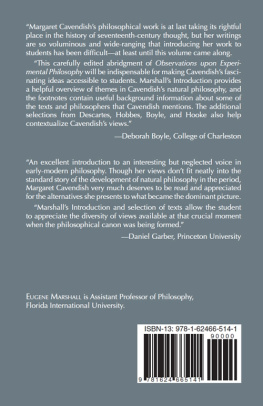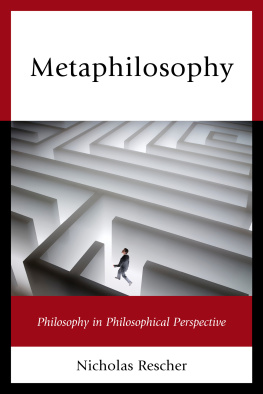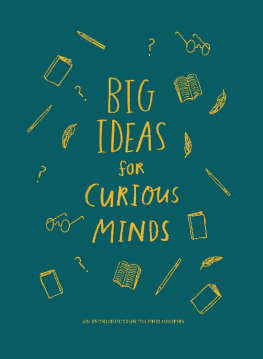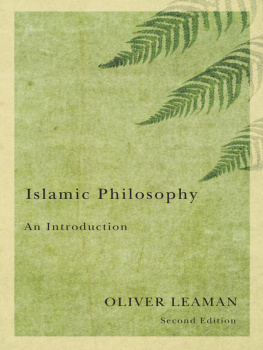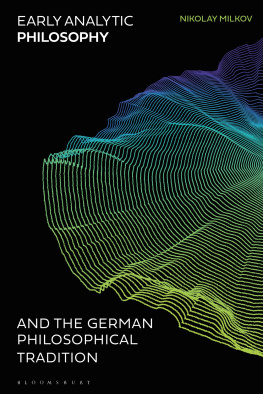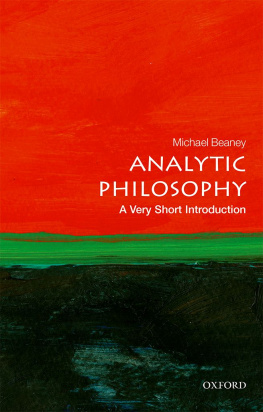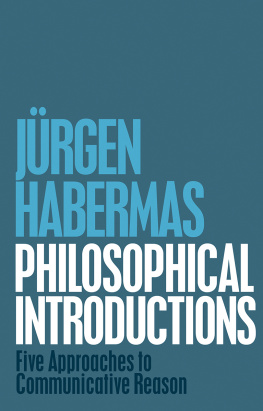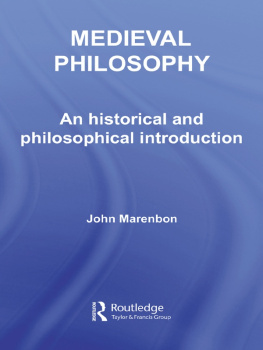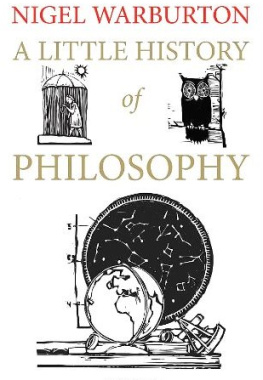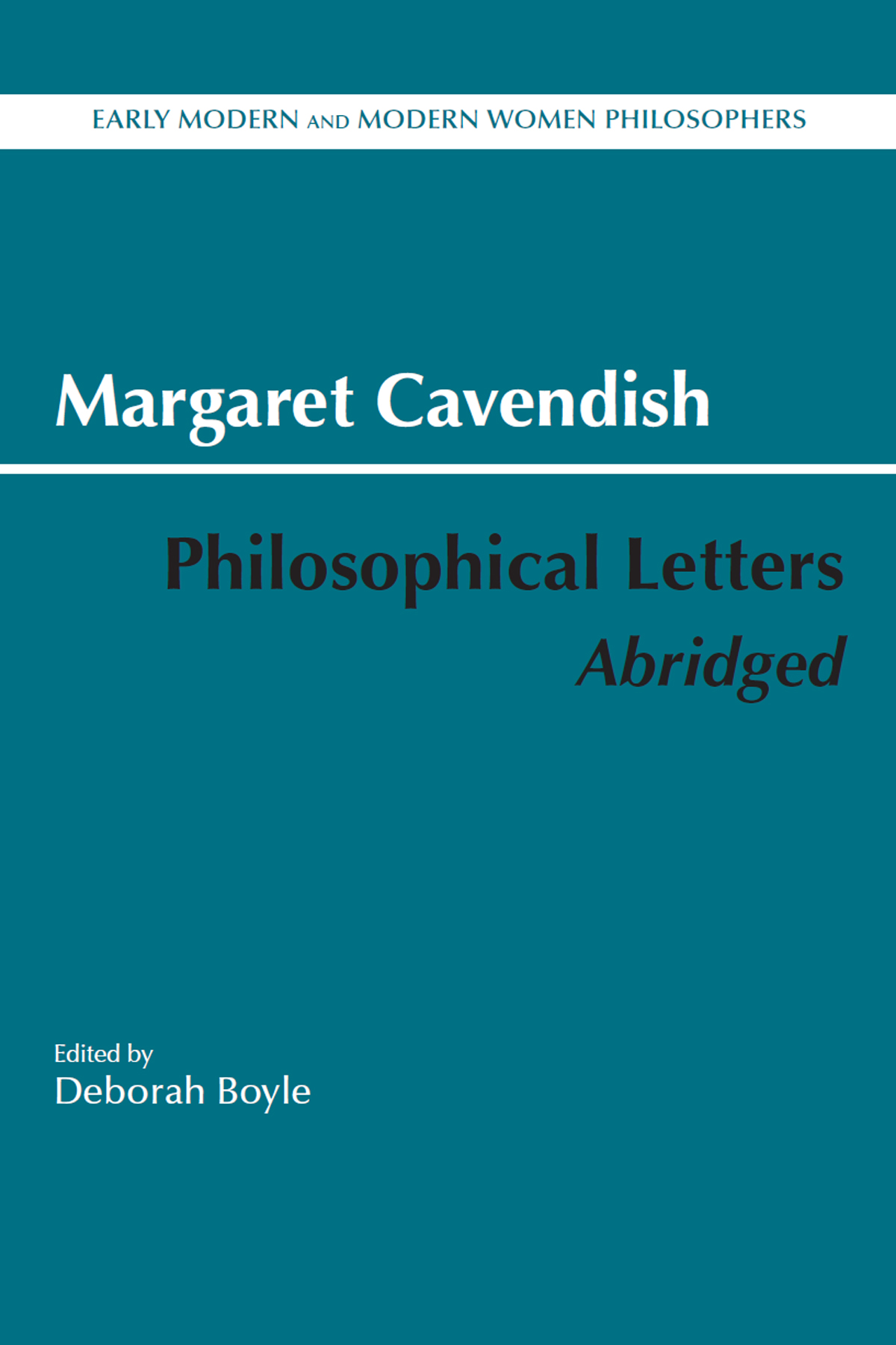CONTENTS
E ARLY M ODERN & M ODERN W OMEN P HILOSOPHERS
MARGARET CAVENDISH
Philosophical Letters
Abridged
E ARLY M ODERN & M ODERN W OMEN P HILOSOPHERS
MARGARET CAVENDISH
Philosophical Letters
Abridged
Edited by
Deborah Boyle
Hackett Publishing Company, Inc.
Indianapolis/Cambridge
Copyright 2021 by Hackett Publishing Company, Inc.
All rights reserved
Printed in the United States of America
24 23 22 21 1 2 3 4 5 6 7
For further information, please address
Hackett Publishing Company, Inc.
P.O. Box 44937
Indianapolis, Indiana 46244-0937
www.hackettpublishing.com
Cover design adapted by E. L. Wilson
Interior design by Elana Rosenthal
Composition by Aptara, Inc.
Library of Congress Control Number: 2020950103
ISBN-13: 978-1-62466-974-3 (cloth)
ISBN-13: 978-1-62466-973-6 (pbk.)
ePub3 ISBN: 978-1-64792-020-3
Kindle ISBN: 978-1-64792-021-0
Margaret Cavendish, Observations upon Experimental Philosophy, Abridged, with Related Texts . Edited, with an Introduction, by Eugene Marshall.
Thomas Hobbes, Leviathan, with selected variants from the Latin edition of 1668 . Edited, with Introduction, by Edwin Curley.
Modern Philosophy: An Anthology of Primary Sources , Third Edition. Edited by Roger Ariew and Eric Watkins.
Mary Wollstonecraft, A Vindication of the Rights of Woman, Abridged, with Related Texts . Edited, with an Introduction and Notes, by Philip Barnard and Stephen Shapiro.
Women Philosophers of the Early Modern Period . Edited, with Introduction, by Margaret Atherton.
CONTENTS
The page numbers in curly braces {} correspond to the print edition of this title.
{vii}
In a time when few women published their writings, even anonymously, Margaret Cavendish (16231673) published more than a dozen books under her own name. In an era dominated by theories that treated matter as inert, she argued that matter is intrinsically self-moving and perceptive; in a culture that viewed the natural world as created for human use, she maintained that humans were no more special than other creatures, and that to think otherwise was hubris. She was the first woman to be allowed to visit the Royal Society of London, where she saw the experiments and scientific apparatus of the new science of the seventeenth century. Although she described herself as bashful around others, she was bold in print.
For all of this, Cavendish gained a certain notoriety in her lifetime; a 1667 entry of Samuel Pepyss famous diary reported that the whole story of this lady is a romance.
Only in the past few decades has Cavendishs work been subject to serious scholarly consideration. Her poetry, plays, and 1666 work of science fiction, The Description of a New World, Called the Blazing World , started to receive attention in the 1980s, with the focus on her views about gender.
This system was first laid out in Cavendishs 1653 book, Philosophicall Fancies . She expanded this work into the 1655 Philosophical and Physical Opinions ; she then revised the 1655 book for a 1663 second edition, which was, in turn, the basis for Cavendishs final treatise in natural philosophy, Grounds of Natural Philosophy (1668). Along the way, she published two more works in natural philosophy, Philosophical Letters (1664) and Observations upon Experimental Philosophy (1666), which was published with its companion piece, Blazing World . Some of these volumes have now been published in modern editions, and selected letters from Philosophical Letters have appeared in anthologies of her works. This edition of Philosophical Letters aims to make this important text available to students, teachers, and scholars in an accessible, abridged format.
{ix} Philosophical Letters is worth reading for several reasons. First and foremost, it is a valuable source for understanding Cavendishs own philosophical system. Cavendish herself emphasizes in the Preface that her purpose in examining the works of others is to make my own opinions the more intelligible ( PL b1v/3). Thus we find in Philosophical Letters detailed discussions of her views and arguments regarding self-moving matter, perception, the relation between God and nature, and other aspects of her natural philosophy and epistemology. Indeed, whereas in her other works of natural philosophy Cavendish often simply states her views, Philosophical Letters contains much more defense of those views.
But because Cavendish is directly engaging with the views of her contemporaries, the letters also show that she was not working in an intellectual vacuum; she was well versed in the work of Thomas Hobbes, Ren Descartes, Henry More, and others. While Cavendish notes that juxtaposing her views against others makes her own views clearer, doing so helps us understand the views she is criticizing too. To read Philosophical Letters is to get a clearer picture of the shape of philosophy in the seventeenth century.
Finally, Philosophical Letters is fascinating for its genre.
Some published correspondence of the early modern period focused on philosophy; for example, Robert Boyle presented his book of accounts of experiments with the air pump in the form of a letter to his nephew Lord Dungarvan, So Cavendishs choice, as a woman, to publish letters on philosophy was striking.
It is also striking that Cavendishs female correspondent was (as far as we know) fictional. While the genre of the epistolary novel only took off in the eighteenth century, publications of letters to or from imaginary characters were not {xi} uncommon in the seventeenth; examples are Nicholas Bretons A Post With a Packet of Mad Letters (1602), Madeleine de Scudrys Amorous Letters from Various Contemporary Authors (1641), and Cavendishs own CCXI Sociable Letters (1664). Occasionally these publications covered philosophical topics. To take Robert Boyle as an example again, his 1659 book Some Motives and Incentives to the Love of God (often referred to as Seraphic Love ) was published as a letter to a fictional correspondent named Lindamor.
Philosophical Letters may well be unique for the way it combines preexisting elements in one work: they are letters exclusively on philosophical topics, penned from a real woman philosopher to an imaginary female correspondent, and published so that the public could read them. As Jacqueline Broad has noted, Cavendish also adapted the genre of correspondence to suit her own purposes in Philosophical Letters :
Cavendish completely disregards the typical conventions of letter writing. Her letters are undated and without location; she never exchanges any personal details or topical news; and the quantity of letters is unusually large.... The correspondence serves as convenient rhetorical device.
The voice in Philosophical Letters is entirely Cavendishs own, and she is entirely in control of the direction that the correspondence takes.
Margaret Cavendish was born in 1623 to a landowning family in Colchester, England.
Cavendishs life was irrevocably changed by the English Civil War. She and her family were members of the Anglican Church and supporters of King Charles I. Indeed, Margarets brother John was a tax collector for the king, and it was, in part, the kings collection of taxes without parliamentary approval that led to public opposition to the royal regime.
Soon thereafter, at the age of twenty, Cavendish made a decision that surprised her family: she joined the court of Queen Henrietta Maria as a maid of honor. This meant moving to Oxford, where the king was conducting business and the queen was ensconced in Merton College. The duties of maids of honor were minimal, for they were primarily expected to wait in an anteroom until needed by the queen, and to stand at attention in the formal dining room while {xiii} the queen ate. The country was in upheaval, and the war was going poorly for the Royalists; the Scottish had joined the Parliamentarian side, and in 1644 they invaded England. With the Parliamentary army advancing on Oxford, the queen and her entourage made a harrowing escape to Paris.

